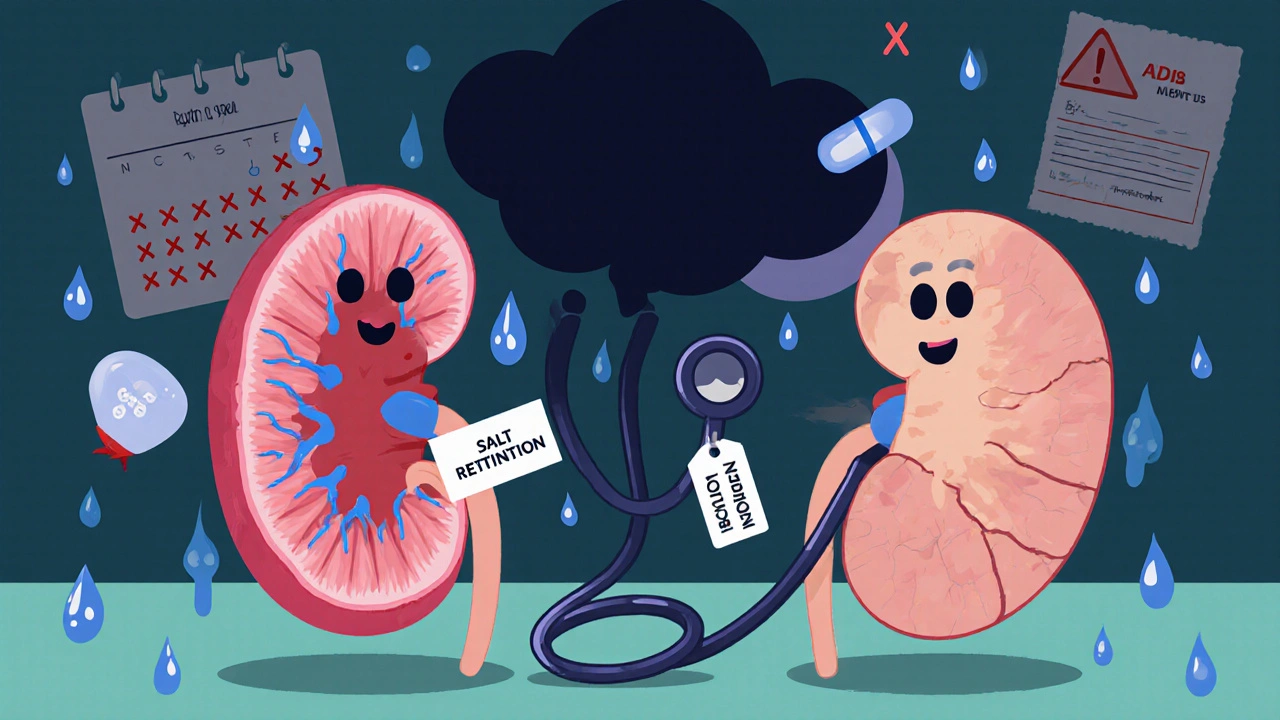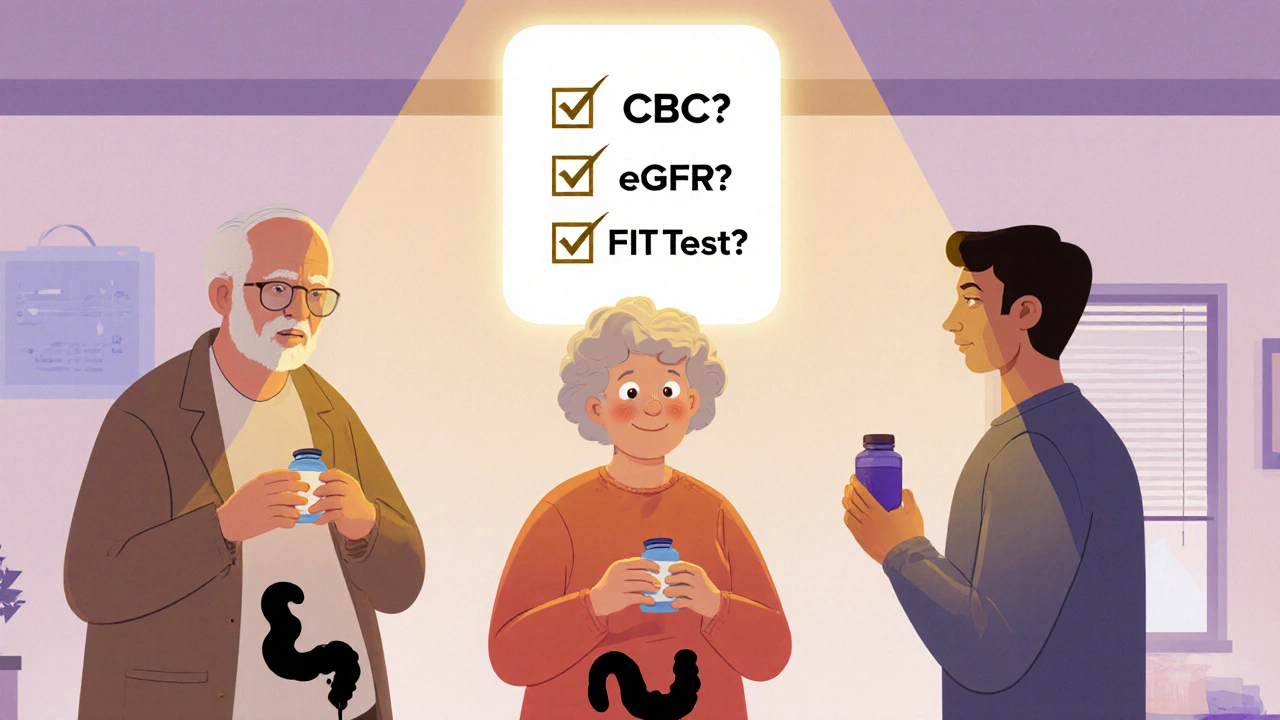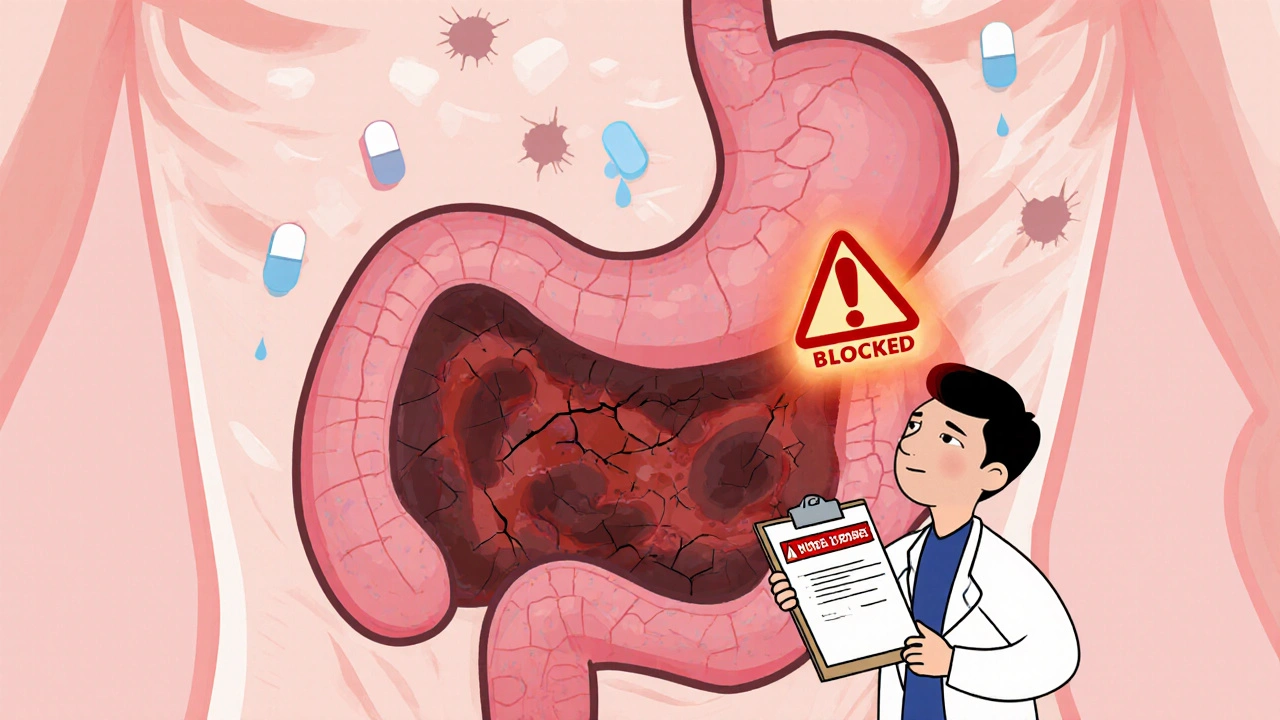Every year, millions of people reach for ibuprofen, naproxen, or celecoxib to ease a headache, back pain, or arthritis flare-up. These drugs work fast. But what most users don’t realize is that NSAID use isn’t harmless-even when taken as directed. Behind the relief lies a quiet, often invisible threat: damage to your stomach, intestines, and kidneys. And it doesn’t always come with warning signs.
How NSAIDs Hurt Your Stomach (Even When You Feel Fine)
NSAIDs block enzymes called COX-1 and COX-2. COX-2 causes inflammation and pain, so blocking it helps. But COX-1 protects your stomach lining by making prostaglandins-chemicals that keep mucus and blood flow steady. When NSAIDs shut down COX-1, your stomach loses its natural shield. That’s why up to 50% of people who take NSAIDs long-term develop some level of stomach irritation, even if they don’t feel pain.What’s worse? Half of these cases show no symptoms at all. You might not feel burning, nausea, or bloating until it’s too late. A bleeding ulcer can form silently. One day, you’re fine. The next, you’re in the ER with black, tarry stools or signs of anemia from slow, hidden blood loss. Studies show NSAIDs cause more than 100,000 hospitalizations and 16,500 deaths each year in the U.S. alone. That’s more than car accidents in some years.
It’s not just the stomach. NSAIDs also attack the small and large intestines. This is called NSAID-induced enteropathy. Unlike stomach ulcers, there’s no reliable way to prevent or treat it. No pill, no supplement, no diet change has been proven to stop it. The damage builds over time-tiny erosions, inflammation, even perforations. And because symptoms like chronic diarrhea or cramping are often blamed on IBS or food poisoning, many people don’t connect them to their daily painkiller.
Kidney Damage: The Silent Threat You Can’t Feel
Your kidneys rely on prostaglandins to keep blood flowing through them, especially when you’re dehydrated, older, or have high blood pressure. NSAIDs block those same prostaglandins. That means less blood reaches your kidneys. In response, they start holding onto salt and water, which can raise your blood pressure and cause swelling in your legs or ankles.Acute kidney injury from NSAIDs isn’t rare-it happens in 1% to 5% of users. For people over 65, those with heart failure, diabetes, or existing kidney disease, the risk jumps sharply. A 2022 FDA warning now requires all prescription NSAIDs to carry a boxed warning about kidney risks in older adults. That’s the strongest type of warning the FDA gives.
Chronic use can lead to something called analgesic nephropathy. It’s rare but serious: scarring of the kidney tissue, reduced filtering ability, and even papillary necrosis-where parts of the kidney die. These changes are often permanent. And once kidney function drops, it rarely comes back fully.
Many people don’t know their kidneys are under stress until a routine blood test shows high creatinine or low eGFR. That’s why checking kidney function isn’t optional-it’s essential. Yet only 52% of NSAID users have their creatinine checked within 90 days of starting, according to Medicare data. If you’re taking NSAIDs regularly, ask your doctor for a blood test every 3 to 6 months.
Who’s at Highest Risk?
Not everyone faces the same danger. Your risk depends on your age, health, and other meds you take.- Age 65+: Your stomach lining thins, kidneys slow down. Risk doubles.
- History of ulcers or GI bleeding: You’re 3 times more likely to bleed again.
- Taking blood thinners (warfarin, apixaban) or SSRIs (like sertraline): This combo increases bleeding risk by over 3 times.
- Using corticosteroids (prednisone): Even low doses add to stomach damage.
- Chronic kidney disease (eGFR under 60): The American College of Cardiology now says avoid NSAIDs entirely in this group.
A simple tool called the ACG Risk Calculator can help. Give yourself 2 points if you’re over 65, 3 if you’ve had a past ulcer, 2 if you’re on blood thinners, and 1 if you take steroids. If your score is 4 or higher, you’re high risk. That means you shouldn’t be taking NSAIDs without strong protection.

Which NSAID Is Safest?
Not all NSAIDs are created equal. Here’s what the data shows:| NSAID | GI Bleeding Risk (vs. non-users) | Kidney Risk | Cardiovascular Risk |
|---|---|---|---|
| Naproxen | 4.2x higher | High | Lower than others |
| Ibuprofen | 2.7x higher | High | Higher than naproxen |
| Celecoxib (COX-2 selective) | 1.9x higher | Medium | Higher than naproxen |
| Diclofenac | High | High | Very high |
For stomach safety, celecoxib is better than naproxen or ibuprofen. But it’s not safe for your heart if you’ve had a heart attack. Naproxen has the lowest heart risk among non-selective NSAIDs, but it’s the worst for your stomach. Ibuprofen is widely available over the counter, but it’s also the most likely to cause GI complications compared to celecoxib.
There’s no perfect choice. The best option is often the lowest dose for the shortest time. If you need it daily, talk to your doctor about alternatives like physical therapy, acetaminophen (for pain without inflammation), or topical gels.
Protecting Yourself: What Actually Works
If you must take NSAIDs long-term, here’s what reduces your risk:- Use the lowest dose possible. A 200mg ibuprofen tablet works just as well as 400mg for most people. More doesn’t mean better.
- Limit duration. Each extra week of use increases complication risk by 3% to 5%. If you’ve been taking it for more than 3 months, ask if you still need it.
- Take with food. This helps reduce stomach irritation, but it won’t prevent systemic damage.
- Use a PPI if you’re high risk. Proton pump inhibitors like omeprazole reduce ulcer risk by 70% to 90%. But don’t assume they’re harmless. Long-term PPI use with NSAIDs raises your risk of microscopic colitis by over 6 times.
- Avoid SSRIs and corticosteroids if you can. The combo with NSAIDs is dangerous.
There’s one thing that doesn’t work: taking NSAIDs with milk, antacids, or herbal supplements like ginger or turmeric. These might soothe your stomach temporarily, but they don’t stop the underlying damage.

Monitoring: What Tests You Need
If you’re on NSAIDs for more than a few weeks, you need regular checks:- Basic metabolic panel (creatinine, BUN) every 3-6 months
- Complete blood count (CBC) to check for anemia from hidden bleeding
- Fecal occult blood test every 6 months if you’re high risk
- eGFR calculation to track kidney function over time
Some new tools are emerging. A point-of-care fecal immunochemical test (FIT), launched in 2024, detects tiny amounts of blood in stool with 92% accuracy-far better than old stool tests. It’s now being used in clinics for patients on long-term NSAIDs.
And if you’re over 75 or have a history of ulcers, your doctor may recommend an endoscopy before starting NSAIDs. It’s not fun, but it’s the only way to see if you already have damage.
What Patients Are Saying
Real people are dropping NSAIDs-not because they don’t work, but because they’re scared.On Reddit, users report diarrhea lasting days after stopping naproxen. On WebMD, 42% of negative reviews mention bleeding without warning. On Drugs.com, 22% of celecoxib users report leg swelling-signs of kidney strain. And 57% of long-term users quit because of side effects, according to a 2022 survey.
One user wrote: "I took ibuprofen every day for 5 years. I felt fine. Then I passed out from low blood pressure. Turns out I was bleeding inside and didn’t know it."
That’s the problem. You feel fine until you don’t.
The Bottom Line
NSAIDs are powerful tools. But they’re not harmless. They can quietly damage your stomach, intestines, and kidneys-often without warning. The safest NSAID is the one you don’t take.If you need pain relief, talk to your doctor about alternatives. If you must use NSAIDs, use the lowest dose for the shortest time. Get your kidneys and blood checked regularly. Don’t assume a PPI makes you safe-it doesn’t protect your intestines, and it brings its own risks.
There’s no magic pill to make NSAIDs safe. Only smart, informed use can reduce the danger. Your body doesn’t always scream before it breaks. So speak up. Ask questions. Get tested. Because when it comes to NSAIDs, the best protection isn’t a drug-it’s awareness.


Robin Johnson
November 23, 2025 AT 07:40I took ibuprofen daily for 8 years. Felt fine. Then one morning I passed out. ER found a bleeding ulcer and Hb of 6. No warning. No pain. Just gone. Don’t be me.
luke young
November 24, 2025 AT 23:18Really appreciate this breakdown. I’ve been on naproxen for arthritis and had no idea it was silently wrecking my gut. Just started a PPI and got my first blood test scheduled. Better late than never, right?
james lucas
November 25, 2025 AT 07:58man i just thought celecoxib was the safe one cause it doesnt hurt my stomach but now im reading it might be worse for my heart and kidneys?? wow. i been takin it for 3 years like its vitamin c. i think i need to talk to my doc before i keel over. also why does every doc just hand out these like candy??
Jessica Correa
November 25, 2025 AT 12:52My mom had a GI bleed from naproxen and didn’t know until she was in ICU. She’s 71. Now she takes acetaminophen and does physical therapy. It’s slower but she’s alive. Please get tested if you’re on these long term. No excuses.
manish chaturvedi
November 26, 2025 AT 09:14In India, many elderly rely on NSAIDs due to limited access to physiotherapy or pain specialists. This post is vital. We must educate communities that ‘no pain’ does not mean ‘no damage’. Doctors here rarely screen kidney function unless symptoms appear. Change starts with awareness.
Nikhil Chaurasia
November 27, 2025 AT 12:49I cried reading this. Not because I’m weak. Because I took 600mg of ibuprofen every day for 10 years. Thought I was tough. Turns out I was just numb. My kidneys are at 58% now. I wish I’d known sooner. I’m so sorry to my body.
Michael Fitzpatrick
November 28, 2025 AT 06:53It’s wild how we treat these drugs like they’re harmless candy. We’ll take a pill for a headache like it’s nothing, but if you told someone to drink bleach for a headache they’d think you’re insane. NSAIDs are just slow-acting bleach for your insides. And nobody warns you. The system is broken. We need better public health messaging. Like, billboards. TV ads. Something.
Shawn Daughhetee
November 29, 2025 AT 17:42Just got my first CBC and creatinine back. eGFR 61. I’m 58. Took celecoxib for 4 years. I’m stopping. Going to try turmeric paste and yoga. I know it’s not magic but at least I’m not poisoning myself. Also why is this info not on the bottle?
Miruna Alexandru
November 29, 2025 AT 20:26Let’s be clear: the pharmaceutical industry profits from chronic pain and the subsequent management of its iatrogenic consequences. NSAIDs are not ‘safe when used as directed’ - they are designed to be used until they cause harm, creating a market for PPIs, endoscopies, and dialysis. This is capitalism disguised as medicine.
Justin Daniel
November 30, 2025 AT 06:13So let me get this straight… the safest NSAID is the one you don’t take… and the second safest is the one your doctor prescribes? 😏
Melvina Zelee
November 30, 2025 AT 11:03i used to think if i didnt feel it then it aint happenin but turns out my body was screaming and i was just too busy scrolling to hear it. i started taking 200mg ibuprofen for my back and now i got kidney issues and i didnt even know it. i think i need to sit down and listen to my body for once. maybe its been trying to tell me something for years
steve o'connor
November 30, 2025 AT 21:53My GP gave me diclofenac for a sprain. Said it was ‘stronger’. I took it for two weeks. Swelling in my ankles. Got a blood test. Creatinine up. He apologized. Said he didn’t know I was on SSRIs too. We’re all just guessing sometimes. Knowledge is power.
ann smith
December 1, 2025 AT 08:22Thank you for sharing this. 🙏 I’m 62 and started NSAIDs after my hip surgery. Now I’m on a PPI, get bloodwork every 4 months, and I’ve cut my dose in half. I’m not giving up pain relief - I’m just choosing it smarter. You’re not weak for asking for help. You’re wise.
Julie Pulvino
December 1, 2025 AT 14:04My sister got a kidney transplant last year. They said it was probably from years of NSAIDs and ibuprofen for migraines. She was 45. She’s alive now but she’ll be on meds forever. I stopped taking naproxen cold turkey after hearing her story. I’d rather live with some pain than lose my kidneys.
Patrick Marsh
December 2, 2025 AT 18:52Stop. Test. Talk. Change.